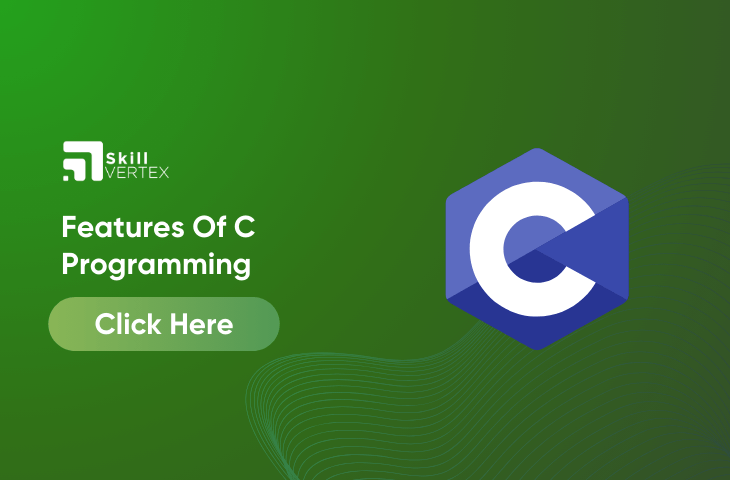Table of Contents
C Programming Language
C programming, often just called “C,” is a very important computer language that’s been around for a long time. It’s liked by many because it’s flexible and has powerful features. In this discussion about C programming, we’ll look at what makes it special, like how it’s simple, efficient, and can do a lot of things at a low level. We’ll also talk about the many tools it has to help programmers.
What are the Most Important Features of C Language?
Here are some of the most important features of the C language:
- Procedural Language
- Fast and Efficient
- Modularity
- Statically Type
- General-Purpose Language
- Rich set of built-in Operators
- Libraries with Rich Functions
- Middle-Level Language
- Portability
- Easy to Extend
1. Procedural Language
In a procedural language like C, tasks are carried out step by step using predefined instructions. A C program can have multiple functions to accomplish a specific task. Beginners in programming might think that this is the only way programming languages work, but there are other programming approaches too. One of the most commonly used paradigms is object-oriented programming (OOP).
2. Fast and Efficient
Languages like Java and Python offer more features than C, but they can be slower due to extra processing. C, as a middle-level language, lets programmers work directly with computer hardware, which higher-level languages don’t allow. That’s why C is often the first choice for learning programming. It’s fast because statically typed languages like C tend to be faster than dynamically typed languages.
3. Modularity
The idea of saving C programming code in libraries for later use is called “modularity.” C programming can’t do much on its own; most of its capabilities come from its libraries. C has its own library for solving common problems.
4. Statically Type
The C programming language is statically typed. This means that the data type of a variable is checked at the time of compilation, not during the actual execution of the program. Consequently, whenever a programmer writes a program in C, they are required to specify the type of variables they intend to use in advance, helping catch potential errors and optimize memory allocation during compilation.
5. General-Purpose Language
The C programming language finds applications in a wide range of fields, from system programming to photo editing software. Here are some common areas where C is used:
- Operating Systems: C is the language of choice for developing operating systems such as Windows, Linux, iOS, Android, and macOS (OS X).
- Databases: C is used in the development of database management systems (DBMS) like PostgreSQL, Oracle, MySQL, and Microsoft SQL Server.
These examples highlight the versatility and importance of the C programming language across various domains, thanks to its efficiency, low-level capabilities, and portability.
6. Rich set of built-in Operators
C is indeed a versatile language with a wide array of built-in operators. These operators are essential tools used in crafting both complex and straightforward C programs, making it a flexible and powerful language for a broad range of applications.
7. Libraries with Rich Functions
C’s robust libraries and functions are incredibly helpful, even for beginners in coding. These libraries and functions provide pre-written code for various common tasks and operations, allowing novice programmers to work more efficiently and effectively. They serve as building blocks that simplify the coding process and make it accessible to individuals who are just starting their coding journey.
8. Middle-Level Language
C is often referred to as a middle-level language because it combines elements of both low-level assembly languages and high-level languages. It provides programmers with a balance of low-level hardware manipulation capabilities and high-level abstractions, making it a versatile choice for a wide range of programming tasks. This unique combination of features allows developers to have fine-grained control over computer hardware while still benefiting from higher-level programming conveniences.
9. Portability
C language is renowned for its portability. Programs written in C can often run and compile on various systems with minimal or no modifications. This portability is one of C’s significant advantages, making it a preferred choice for developing cross-platform applications and ensuring that code can be easily adapted to different environments without major rewrites.
10. Easy to Extend
Programs written in the C language can be extended or enhanced. C’s flexibility allows programmers to add new features, functions, or operations to an existing program. This extensibility is one of the strengths of the C language, as it enables developers to build upon and improve existing codebases to meet evolving requirements or add new functionality without starting from scratch. It promotes code reusability and efficient software development practices.
FAQ- Features Of C Programming Language
Q1. What are the 4 types of programming languages?
Ans. Those 4 types of programming languages are :
Procedural programming languages.
Functional programming languages.
Object-oriented programming languages.
Scripting languages.
Logic programming languages.
Q2. What is C programming in computers?
Ans. Indeed, the C programming language is a procedural and general-purpose language known for providing low-level access to system memory. This compilation step is a crucial part of the C programming workflow, ensuring that the code is translated into a format that the computer’s hardware can execute.
Q3.Where is C language used?
Ans. C programming is a versatile language that can be used to create many different things, like operating systems, databases, and games. It’s not tied to a specific type of computer, so it works on various machines. Learning C is a great start if you want to learn other programming languages because it forms a strong foundation for programming skills.
Hello, I’m Hridhya Manoj. I’m passionate about technology and its ever-evolving landscape. With a deep love for writing and a curious mind, I enjoy translating complex concepts into understandable, engaging content. Let’s explore the world of tech together

